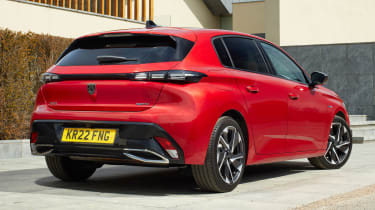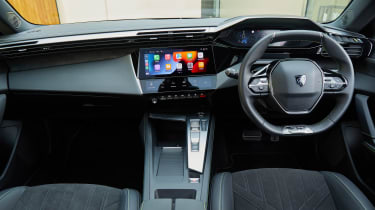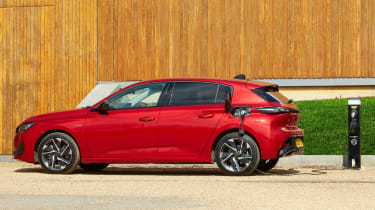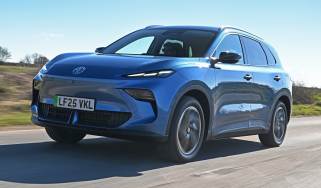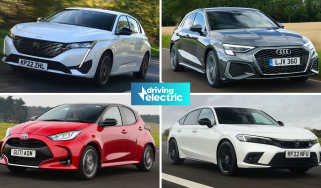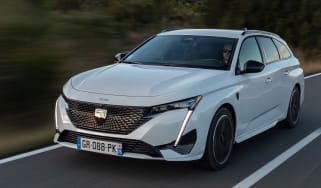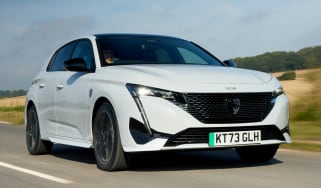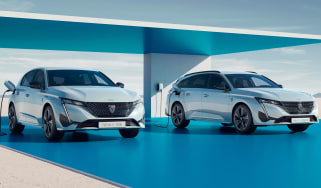Peugeot 308 Hybrid review
This plug-in Volkswagen Golf rival stands out thanks to its styling, interior and handling – however, its boot capacity and rear cabin space aren't class-leading
Pros
- Styling
- Good to drive
- Interior quality
Cons
- Rear space
- Limited practicality
- Expensive top-spec versions
| Model | Electric range | Fuel economy | CO2 emissions |
|---|---|---|---|
| Hybrid 180 | 37 miles | 214-281mpg | 25-26g/km |
| Hybrid 225 | 37 miles | 214-266mpg | 26-27g/km |
The Peugeot 308 has been around since 2007, but it was only with the launch of the second generation in 2013 that the car really became a credible competitor for the likes of the Volkswagen Golf, Ford Focus and Vauxhall Astra.
Now, the third-generation 308 has arrived, sharing underpinnings with both the latest Astra and the upmarket DS 4, but boasting striking exterior styling to set it clearly apart from its stablemates. Like those cars, it’s available now with plug-in hybrid power, while a fully electric version will arrive in 2023. We’re concentrating on the 308 hybrid hatchback in this review, but have also driven the SW estate version.
There are two plug-in hybrid 308s available, both using a 110bhp electric motor and 12.4kWh battery, as well as an eight-speed automatic gearbox. But total power output jumps from 178bhp in the Hybrid 180 model to 222bhp in the Hybrid 225, thanks to a punchier version of the petrol engine under the bonnet.
To be honest, it's hard to tell the difference between the two in everyday driving, as they deliver their power in a very similar way, with an initial kickdown from the gearbox, some petrol-engine torque and then a wave of electric-motor boost. This is borne out by their 0-62mph times, which are just a tenth of a second apart.
Peugeot claims up to 37 miles of pure-electric driving is possible, although you’re likely to get closer to 30 in normal driving. That should be enough for most commutes, however, and you still benefit from a reduction in company-car tax compared to the equivalent diesel. The Mercedes A 250 e does attract a lower BiK rate of 8% thanks to its longer zero-emissions range, but the 308’s 12% rating is nothing to scoff at regardless.
So why chose the 308 over any of its similarly electrified rivals? First of all, the cabin is a masterpiece in modern design. While the French brand’s i-Cockpit dashboard set-up remains polarising, material quality overall is very good, (save for a few cheaper plastic pieces on the centre console) and the seats are both comfortable and supportive.
All plug-in hybrid 308s get a 10-inch central infotainment touchscreen as standard, which isn't the most intuitive system we’ve used, but it’s responsive and has a row of shortcut buttons under the screen for quicker access to key functions, with some additional physical 'piano keys' for systems such as the climate control and heated rear screen. Plus, you get Apple CarPlay and Android Auto phone connectivity as standard, too.
The 308 is also a sportier and more engaging alternative to its comfort-focused sister car, the DS 4. That’s not to say the Peugeot’s ride is harsh – far from it – but it just feels more poised and controlled. Even this heavier plug-in hybrid version is able to stay admirably flat during fast changes of direction. The small steering wheel also contributes to the sense of fun, although isn’t exactly brimming with feedback. A Sport mode brings more weight to the steering and sees the car hold on to gears for longer when accelerating.
Like a lot of plug-in hybrids, though, the Peugeot is at its most relaxed when running on electric power, as it’s capable of quietly gliding along at motorway speeds. Gentle cruising in hybrid mode, even when the engine is engaged, is fairly quiet, too. Put your foot down and the boost from the electric motor shows the 308 can be a quick car, but doing so also unleashes a harsh, strained sound from the petrol engine as it kicks in.
The eight-speed transmission isn’t the smartest we've experience, sometimes taking too long to shift up or down or shifting up at the wrong time for the sake of fuel efficiency. But, switch to manual mode and use the paddles on the steering wheel and gear changes suddenly become quick. There's also a B mode for regenerative braking that some may find a little aggressive at first, however the system adapts to your inputs. Sadly, it seems to reset after your turn off the car, which is a quite frustrating.
Topping up the 308’s battery regularly will not only ensure you can move as many miles as possible on electric power, but also reduces running costs. As standard, the plug-in 308 comes with a 3.6kW on-board charger, meaning fully recharging the 12.4kWh battery will take around three-and-a-half hours from a wallbox. You can upgrade to a 7kW unit that cuts the time to two hours from a point capable of that speed. Don't keep the battery topped up, on petrol power alone the Peugeot will struggle to return more than 40mpg due to the dead weight, compared to the roughly 250mpg Peugeot claims the plug-in hatchback can achieve.
Where the 308 hybrid falters is practicality. The biggest issue is the amount of room in the rear seats, where taller adults may struggle for space. Head and legroom are adequate for average-sized adults, but nothing more despite this latest 308 being 105mm longer than its predecessor – even the wheelbase is up 55mm. This is a problem we also found with the DS 4 and with the latest Vauxhall Astra.
Boot space for this hatchback variant also drops from 412 litres in the petrol-powered model to 361 litres and there’s no underfloor storage for the charging cables. However, the amount of boot space in the 308 hybrid is more than the plug-in Mercedes A-Class or SEAT Leon e-Hybrid can offer, and remember there’s an estate version of the 308 that boasts 548 litres of boot space if you need that extra load capacity.
Prices for the plug-in hybrid 308 hatchback can get close to £39,000 if you go for the more potent Hybrid 225 powertrain in the GT or GT Premium trims, which provide extra luxuries and safety features. The top-spec GT Premium features a Focal stereo, 360-degree cameras and larger 18-inch wheels. GT and GT Premium cars also get a 3D digital instrument display, which we’ve previously seen in some of the brand’s other models like the e-208 hatchback. It creates two layers of information, bringing important details to the fore.
Go for the entry-level Allure or Allure Premium trim levels, though, and you still get 17-inch alloy wheels, LED lights and a 10-inch screen with Apple CarPlay and Android Auto. Plus, the cheaper Hybrid 180 powertrain can still manage a 37-mile electric driving range and returns better fuel economy, too, according to Peugeot.
Overall, despite its practicality shortcomings, this latest Peugeot 308 is an accomplished all-rounder that’s good to drive and stands out in the crowded plug-in hybrid hatchback class thanks to its styling and interior.

